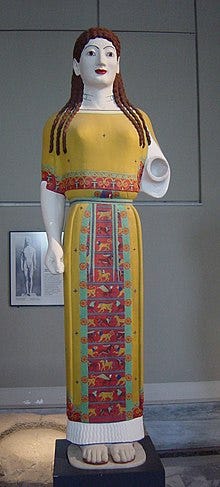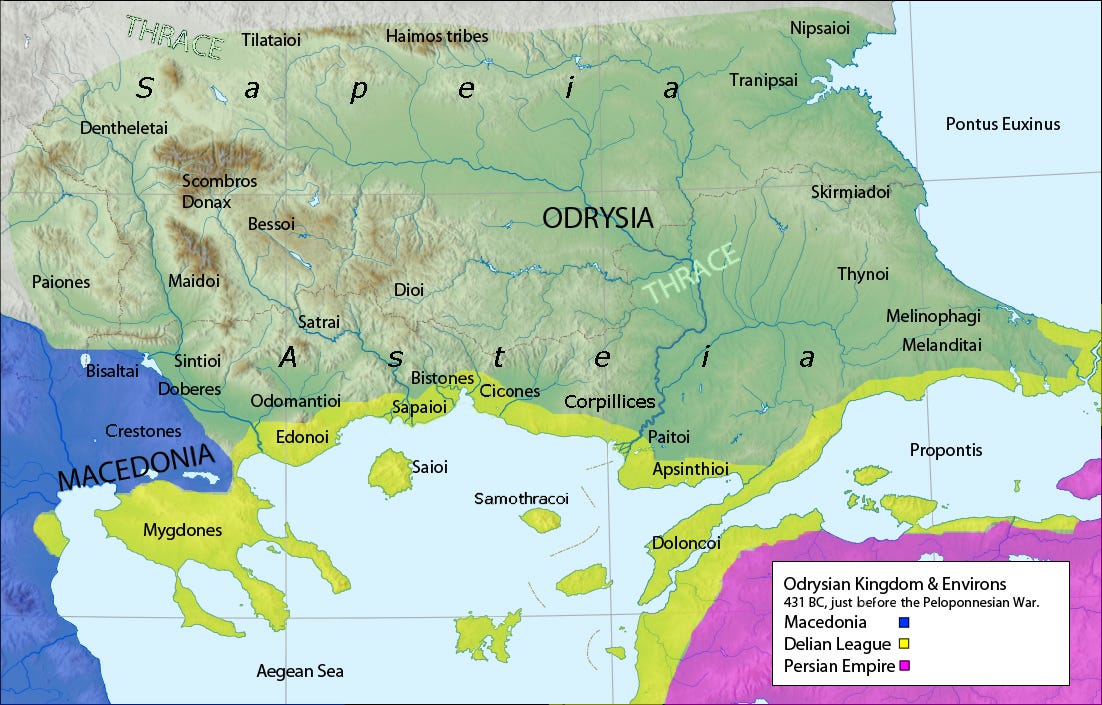Welcome back to my ongoing effort to produce text in my made-up language for my upcoming novel Wealthgiver. We’re now up to Chapter 3, titled Naindáta - “Ascent.”
Last week I showed you a poem that a hidden cave-prophetess recited to the priests of Hades. In the next chapter, they haven’t gotten the message and she’s a bit impatient with them, so she delivers an epilogue.
Pleistorós êrgetar.
ton désaitar!
The Wealthgiver is coming. May the Maiden receive him!
or, more lyrically
Comes the Wealthgiver.
May you him give her!
The rhyme’s a bit forced, but she’s in a hurry.
You’ll notice two important mythological names that we’ve seen before: The Maiden and The Wealthgiver - in modern Good Saráta tse Plistráss. Above, we see the ancient forms of those epithets: Sarḗ ke Pleistorós. You’ll notice some sound changes. Pleistoros was a real god of the Thracians and Dacians, although Herodotus calls him a god of war, rather than of death. Sarḗ is my speculation - the supposed Thracian cognate of Greek kórē.
Chapter 4’s title is Duí Tan Vu Idísam. I'll Take You.
As with other Balkan languages, the future particle developed from a verb meaning "to want." You’ll notice something similar happened in English.
“Désma vu tan. Iríta Dúba tan vu désit.”
We receive you. The Sacred Depths receive you.
This formula of welcome is what the old man tried to say in chapter two. The verb dísam vu is getting a lot of work here. I translate it variously as “take” or “receive” or “welcome.” Specifically, it means taking something willingly, as a gift. Pretty soon I should have examples of all its forms and I’ll be able to give you a conjugation table. I know you love conjugation tables.
There follows some action.
Madí!
Don't!
Ku ié ti?
Where are you?
Brik
(echolocation ping)
Táma ié
There you are.
Oh no! What was all that about? On to the next chapter: Me éma Bessíta - “We are The Good.”
Indésa an Bessikése glóie!
Attend the Good language!
Finally all that running around is over, and we can settle down to a language lesson, delivered by the high priest of Hades. The Bessi were a real Thracian tribe, possibly the last one to go extinct (some time in the 6th century). For the purposes of my novel, the Bessi survive, and took their name from *h₁wésus the Proto-Indo-European root that also gave us the name of the Vissigoths and the Greek prefix eu- as in euphony (“good-sound-ness”).
In tamssése, vu bríma tsiss put.
In the dark, it is clear who pules.
This is an aphorism of the Good. Put is from *peh₂w-, related to “few” “poor” and “pauper.” In Good, it is used for words relating to babies and children. The verb means “to cry like a baby.”
Bríma vu is the passive equivalent of bréma, to echolocate. It means "to echo, to be visible to echolocation" or idiomatically "to be clear/obvious."
An Bessíke, aió ésta 'támssa.’
In Bessian, it is 'darkness.'
La Bessíkit ié nim ésta Sára Zeméla.
But her Good name is Kori Chthamali.
A good Good would never “embed” Good words, including proper names, in foreign sentences. Everyone has a Good name and a name for use in front of the un-initiated. But it shouldn’t be too hard for you to recognize Kori’s Good name, and maybe figure out what it means.
Bessikáta fála ésta 'Da.' Da, delá mi.
The Bessian word is "Earth." Earth, protect me.
Vas im nir. Ti ié tse nir. Saráta ésta sára. Aió ésta zóna
I am a man. You are a man. The Maiden is a maiden. She is a woman.
The language lesson continues, and now we finally have the pronouns and copulas:
Vas em = I am
Ti ié = Thou art
Ái/aió ésta = He/she is
Me éma = We are
Iú éna = You are
Ítsa énza = They are
Ta knéssa ápartka u áprake
To know a narcissus from a viper
“Viper” and “narcissus” are based on real words in Albanian, Romanian and Bulgarian for the slow worm, the viper, the buttercup, and other small yellow things. It may be that these words derive from the root *per-, “to pass,” origin of “for,” “first,” “fare,” “ferry,” “ford,” “port,” “proto-,” and “perish” among many others. The attested Dacian word for the stinking iris - áprus - might also be related. Irises are perennial plants and so do not “pass away” in the winter. Venomous snakes, of course, make you pass away.
The aphorism "to know a narcissus from a viper" is my own invention, and it means knowing what's good for you.

Vas em kaft. Aió ésta semnéa.
I am a priest. She is a prophetess.
'Iú éna,' neláhe.
'You are,' novice.
The priests corrects the main character for using the improper, singular form of "you."
Semnéa dzam...miáta ié fála ésta 'saggeiminaía '
Prophetess means…The ancient word for her is ‘she who is made to sing, she who is inspired.’
In Bessikése ái vu kálit Plistráss tse Desestáss na Plest, Tabráss Tet na Tamát na Nistíta.
In the Bessian, he is called Wealthgiver and Host of Many, the Grim Master of the House of the Dead.
In addition to Ploutodotḗr (Wealthgiver), another epithet of Hades in Greek was Polydégmōn, “host of many.” In Thracian, that might have been Palodégmōn, but sound shifts would have resulted in the unrecognizable +pléma , so modern Good uses Desestáss na Plest "Receiver of Many."
The final Good sentence of the chapter is Vas em Ádass.
Uh oh! Was that a wise thing for our hero to say? Subscribe and find out next week.





